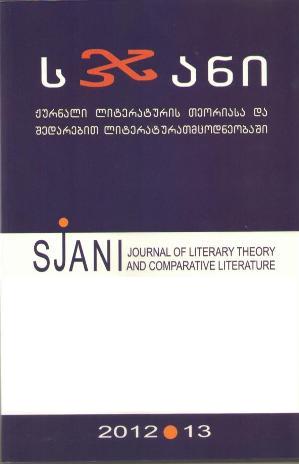ზეპირი ისტორიის თეორიული და მეთოდოლოგიური კვლევის საკითხები
On the Question of the Theoretical and Methodological Research of Oral History
Author(s): Marine TurashviliSubject(s): Literary Texts
Published by: ლიტერატურის ინსტიტუტის გამომცემლობა
Keywords: oral history; methodology; elite/unelite; critical; grounded.
Summary/Abstract: Methodology of oral history, as of the modern scientific sphere, has various sources. Since the 40s of the XIX century the practice of the oral history has been popular in the western academic circles. After choosing a genre of the oral history the next step for a scientist is the selection of the theoretical basis. Despite of the use of the various theoretical approaches in the researches the survey of existing literature singles out three main methods: elite/unelite, critical and grounded. The subject of the elite/unelite theory is the elite oral history against the unelite oral history or who is merited to be recorded. Oral history of elite people is opposite to the oral history of ordinary people – interview practice from “down to up”, earlier supporters of which are British scientists of the 50s and the 60s of the past century. American oral historians catched up this idea only in the 60s. Many programmes of oral history aimed at recording point of view of the witnesses of the history. Such kind of work was a certain combination of topics of interviews with ordinary people as well as with prominent ones and its basic theoretical principles were clarified as far as possible. Basic source of the critical theory is a sphere of the literary criticism. Though afterwards it became a part of many humanitarian and social sciences und oral history was used within their boundaries. In the USA critical theory has many supporters but it has mere influence over Europe, especially over the UK and over Italy. In the works of these scientists class questions are leading. Critical theory is provided with the conception of the ideas and views of the people without official rank. Grounded theory at the beginning demanded of the scientists the approach to the chosen topic without ideas thought out beforehand. Scientists can set up their own conclusions and ideas of the research of a person or a group of people on the basis of analysis and checking the material obtained during the research. As Straus and Juliet Corbin point out the scientist doesn’t start the project with early thought out approach (except the case when the aim is to analyze in details and to deepen existing theory) but tries the assumption to be emerged from the information, hence, the grounded theory zepiri istoriis Teoriuli da meTodologiurikvlevis sakiTxebi 244 stems from the information. The method of the research of the grounded theory has its characteristic traits, which influence over the investigation greatly. The important fact is that some followers of the grounded theory demand of the scientists not to use questions and certain themes thought out beforehand. In the beginning of the research we tried to review theoretical topics of oral history. On this occasion we are discussing problems of recording of oral histories, which are important in obtaining high-grade materials. For getting a successful interview it is significant to have a conversatio
Journal: სჯანი
- Issue Year: 2012
- Issue No: 13
- Page Range: 233-244
- Page Count: 12
- Language: Georgian

